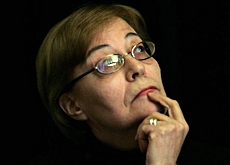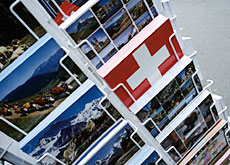Cultural project praised for pioneering work

An expert has praised a Swiss cultural programme helping people rebuild in war-torn Balkan countries and former communist states for its innovation.
British consultant Charles Landry said the scheme, which has kick-started dozens of arts projects, should nevertheless cut paperwork, improve marketing and become more pro-active.
The Swiss Cultural Programme Southeast Europe and Ukraine (SCP) is a joint initiative of the Swiss Arts Council, Pro Helvetia, and the Swiss Agency for Development and Cooperation (SDC).
The SCP has been running for three years in Albania, Serbia and Montenegro, Bosnia and Herzegovina, Macedonia, Bulgaria, Romania and Ukraine.
Its intention is to help communities rebuild after conflicts or ease the transition from communism to democracy while improving relations between cultural factions.
The SDC spends SFr3.5 million ($2.71 million) a year on the initiative, of which SFr2 million funds 40 small arts projects per year in each country, plus 15 longer-term schemes.
The larger initiatives include the start-up of a CD label in Sarajevo, a project in southern Bulgaria aimed at ending the isolation of the minority Turkish community, and a youth culture centre in the Bosnian city of Mostar.
Unique
Landry, who has assessed many such schemes around the world, believes Switzerland’s efforts are unique in their long-term outlook and the use of art to develop culture in the targeted countries.
“The Swiss cultural programme seeks through its intervention in the arts and cultural spheres to bring about change focusing on organisations and projects that foster independent thought, bring communities together, help civil society develop and spark the imagination,” he said.
But Landry criticised the programme for being too rigid, particularly with its budget, and for failing to communicate its achievements broadly enough. He also believes the Swiss workers in the field should take more direct control of the projects they help to set up.
“The Swiss are very self-effacing and do not want to impose themselves,” he told swissinfo. “That can be good sometimes, but some projects need firmer guidance to prevent them from drifting apart.”
Agreement
SDC project leader Denis Knobel, who commissioned Landry’s report along with Pro Helvetia before a three-year review on the programme, said he agreed with many of the proposals.
“I am pleased that the main conceptual approach of the programme has been confirmed. It is quite unique and no other country has attempted such projects,” he told swissinfo.
“We take the results of this study very seriously and we’ll look at his recommendations in the next planning stage.”
Knobel is convinced that cultural development is key to maintaining peace and stability in the countries covered by the programme.
“Culture is not a luxury. It is an important tool to aid reconciliation and help people overcome trauma in post conflict situations,” he said.
swissinfo, Matthew Allen in Zurich
The SDC has 550 staff and annual budget of SFr1.3 billion (2005).
It supports projects in development cooperation, humanitarian aid and cooperation with eastern Europe.
Pro Helvetia was created in 1939 with the objective of protecting Switzerland’s independent cultural identity against the propaganda of Nazi Germany.
It has 74 staff and was allocated funding of SFr137 million for the period 2004-2007.
Set up in 2002, the Swiss Cultural Programme Southeast Europe and Ukraine spends SFr3.5 million a year on cultural projects in the 7 chosen countries. Of this SFr2 million is spent on specific arts projects.
It evolved from a mid-1990s project in eastern European countries such as Poland, the Czech Republic and Hungary. The scheme was stopped when the countries became self-sufficient.
Other long-term projects include a culture management education course in Ukraine, the renovation of former Soviet blocks of flats in Tatarasi, Romania, and a scheme to encourage young artists in Macedonia.

In compliance with the JTI standards
More: SWI swissinfo.ch certified by the Journalism Trust Initiative












You can find an overview of ongoing debates with our journalists here . Please join us!
If you want to start a conversation about a topic raised in this article or want to report factual errors, email us at english@swissinfo.ch.